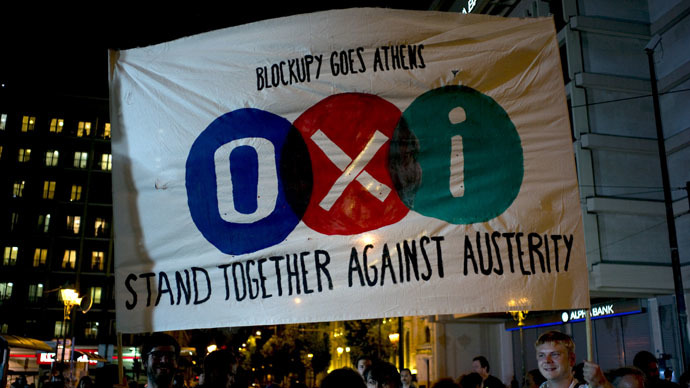Bailout for banks presented as 'bailout of spendthrift and lazy Greeks’

The economic crisis in Greece created deep national divides but it’s not the Greek people’s fault, it’s the fault of the way the European elites have obfuscated the real issues at hand, professor of sociology Costas Panayotakis, told RT.
RT:How come the pollsters got the outcome so wrong - they were predicting the Greeks would agree to the creditors' proposals?
Costas Panayotakis: I think in Greece there is a lot of cynicism about pollsters and how they often times try to manipulate impressions in favor of the pro-austerity camp, but what was interesting was that even newspapers affiliated to the left were seeing a very close vote. So I think perhaps what happened is that there was a change of dynamic at the very end of the campaign - there was a huge rally in favor of “No” in downtown Athens on Friday - and a change of dynamics at the end.
Hansjoerg Mueller, founder and leader of the economic association of Germany’s Euroskeptic AfD party comments on a possible Grexit: “I’m an economist and from the economic point of view the only means by which Athens or the Greek people can be healed from this crisis – is to get their own currency and to depreciate the currency to make a more competitive position in the global market. It’s the only solution that helps Greece, so of course from this point of view I’m in favor of a Grexit”.
RT:Russia's President spoke to the Greek Prime Minister this morning and offered words of support at this time of crisis. Do you think Athens is looking for other allies as part of Plan B?
CP: Greece, including the leadership of the Syriza Party, is committed to Europe and there was just a meeting between the leaders of political parties in Greece coming together to have a common line in the negotiation with Europe. But beyond that it’s fair to say that the Syriza government wants to have a kind of more multidimensional foreign policy, which engages not just with its European partners but with other important countries as well, including Russia.
RT:Germany's Deputy Chancellor said creditors can't let Greece off the hook since Portugal, Spain and Ireland will want the same treatment. Do you think the Greeks started celebrating too soon?
CP: It’s a victory for democracy in Greece. People were under extreme psychological pressure in the workplace, from the media, from European partners to basically vote ‘Yes’. So it’s an important victory for democracy and it’s worth celebrating, but the situation is still very difficult economically and the government is still in a difficult position. It has lots of challenges to face, including the closing of the banks, and I think that’s why it wanted to enlist support from the parties of opposition.
Hansjoerg Mueller, founder and leader of the economic association of Germany’s Euroskeptic AfD party comments on the Greek crisis: “I can underline it from the point of view of the German taxpayer. If a Grexit takes place the German taxpayer will lose €100 billion. It’s a huge sum, but the more the situation will be prolonged this sum will rise and with every single day the burden for the German taxpayer will be even higher. It’s better to have an end now than a worse end in the future.”
RT:Some other German politicians warn that a Greek ‘No’ vote could fuel nationalism in Europe. Do you think that's likely?
CP: I think the nationalism has been fuelled by the strategy that has been used by European political elites to scapegoat Greeks and other people in the periphery. What has happened is this economic crisis that divides people along class lines and the original bailout in Greece was designed to primarily bailout German and French banks, but it was presented as a bailout for spendthrift and lazy Greeks. So it created deep sort of national divides and I don’t think this is the fault of the Greek people, this is the fault of the way the European elites have obfuscated the real issues at hand.
The statements, views and opinions expressed in this column are solely those of the author and do not necessarily represent those of RT.
The statements, views and opinions expressed in this column are solely those of the author and do not necessarily represent those of RT.












